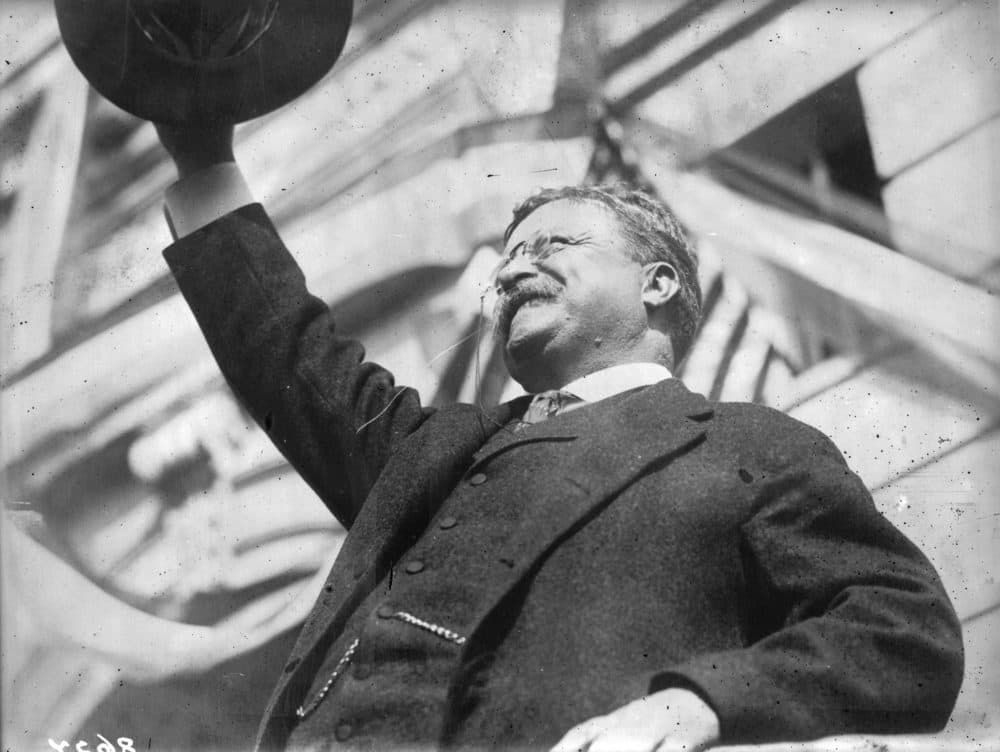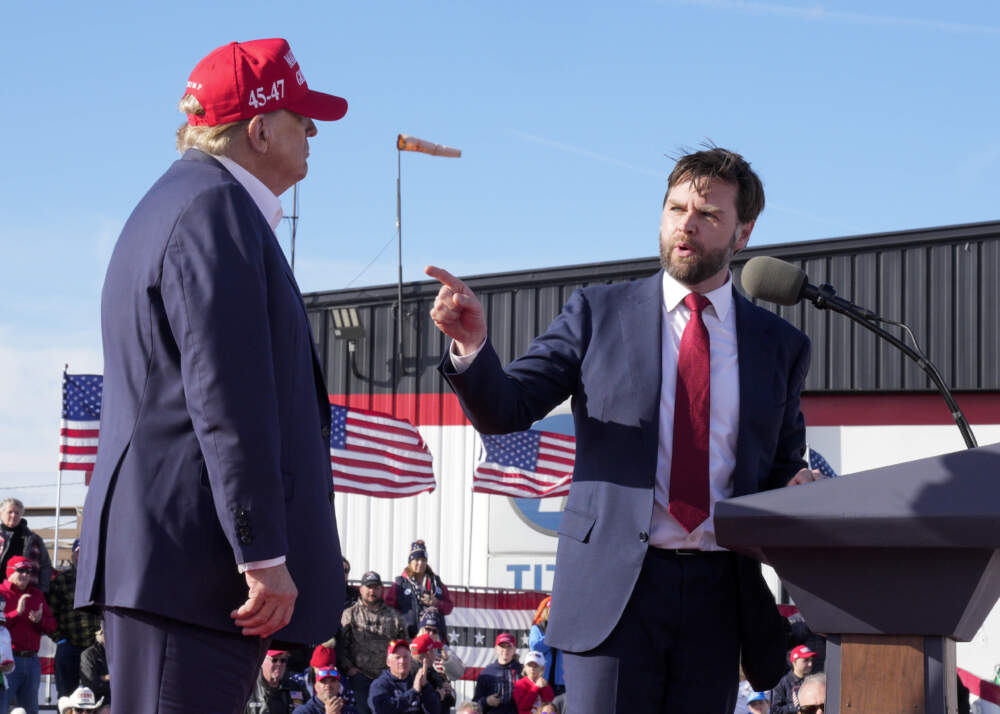Nine times in American history a sitting vice president has risen to the presidency on the death or, in Richard Nixon’s case, the resignation of a president.
Those nine men represent a cross section of the worst and best of American political history.
Theodore Roosevelt, a rambunctious 42-year old when he became president, clearly fits in the best category. In many ways after succeeding the assassinated William McKinley, Roosevelt transformed the presidency, using the bully pulpit and his well-developed political skills to conserve vast amounts of public land in national forests, parks and wildlife refuges.

Teddy had a vision about America’s role in the world and arguably was a principal architect of the American Century. Roosevelt was a scholar/politician who read and wrote books. He remains a supremely engaging character.
John Tyler, Millard Fillmore, Andrew Johnson and Chester A. Arthur also became president following the death of a president and there is ample reason none of them are on Mt. Rushmore.
Tyler was a southerner who welcomed the Civil War, effectively committing treason after leaving the White House. Fillmore was a non-entity, best forgotten. Johnson was a horrible racist even by the standards of his time.
Arthur, surely you remember Chester Arthur, was a machine politician who may have been the best of this fairly sorry lot. Sympathetic historians have concluded that Arthur tried hard to be competent and failed to get credit for clearing that low bar. One biographer concluded of 21st president that, “some people just do the best they can in a difficult situation, and sometimes that turns out just fine.”
Calvin Coolidge following Warren Harding, Harry Truman following Franklin Roosevelt, Lyndon Johnson succeeding John Kennedy and Gerald Ford replacing Nixon have all enjoyed a generally positive historical reassessment.
Coolidge gets graded on the curve in part because Harding, to quote Alice Roosevelt Longworth, “was not a bad man. He was just a slob.” Truman suffered in FDR’s shadow but proved his mettle by staging arguably the greatest presidential comeback in history in 1948. He also recognized Israel, desegregated the armed forces and pushed back against southern segregationists in his own party. Johnson’s record of domestic accomplishment, including the Civil Rights and Voting Rights Acts, compares in impact only to FDR’s. Vietnam was Johnson’s downfall and without it, as has been said, he would have been a great president. That remark caused the eminent economist John Kenneth Galbraith to quip “and except for the mountains Switzerland would be a flat country.”
A new biography of Ford, the accidental vice president, makes a strong case for the man’s decency and common sense. Biographer Richard Norton Smith notes Ford’s decency by remembering that in the last year of his presidency he had the good grace to present the Presidential Medal of Freedom to a remarkable collection of great Americans: Jesse Owens, Alexander Calder, Georgia O’Keeffe, Norman Rockwell, Lowell Thomas, General Omar Bradley, Irving Berlin, Martha Graham and historians Will and Ariel Durant.
Texan John Nance Garner, one of Franklin Roosevelt’s three vice presidents, reportedly said of the vice presidency that it “isn’t worth a bucket of warm spit.” But, ol’ Cactus Jack was wrong. Sometimes it’s worth everything, the whole enchilada. (By the way, Garner used a word other than spit.)
Presidents do die in office (or in one case resigns) and the understudy is elevated to the pinnacle.
While we contemplate Donald Trump’s increasingly wrong footed selection of an untested 40-year old former venture capitalist as his running mate it is worth remembering that J.D. Vance could be a heartbeat away from the presidency, while serving with a guy who will be 82 should the country survive him serving out another term.

Vance is being pilloried, and properly so, for what appears to be his voluminous writing and speaking – before become a vice presidential candidate – about gender roles and birthing babies, including his particularly incendiary crack about “childless cat ladies.”
Here’s the full Vance quote: “We’re effectively run, in this country, via the Democrats, via our corporate oligarchs, by a bunch of childless cat ladies who are miserable at their own lives and the choices that they’ve made, and so they want to make the rest of the country miserable, too.”
Vance seems like nothing so much as an apostle of the far right fringe Claremont Institute of cultural studies, represented enthusiastically by Scott Yenor, the Boise State University professor who has effectively argued that professional attainment is lost on women whose real place, were it not for “feminism” and civil rights laws, is barefoot and in the kitchen.
Yenor – Vance, too – has argued for a return to a simpler, and in his view better time when old “stereotypes” – man the breadwinner, woman the mom – were in vogue. Make America 1950 Again.
“The problem is this,” Yenor has written. “We have replaced the old ‘stereotypes’ with new, confused ones. Men are thought to be scum. Independent women are taught to have interests that are difficult to reconcile with men and marriage. Education and careers come first. Overcoming old stereotypes becomes the new stereotype. Marriage is delayed. Childbearing is deferred.”
Vance is about as popular right now as Andrew Johnson was when he replaced Abraham Lincoln, with his post-convention polling numbers worse than any vice presidential candidate ever. The first rule of the vice presidency is, of course, “do no harm.” By that token Vance has failed, and with spectacular speed, and he will soon be compared to whatever man Kamala Harris selects as a running mate.
Harris could stumble with her VP pick. It does happen. George McGovern, for instance, bombed with his pick of Thomas Eagleton in 1972 over concerns that seems all these years later a lot less important than arguing that millions of American women – cat lovers or not – should know their place.
Meanwhile, Trump is busy insulting Black Americans and dismissing the guy he’s running with. “Virtually never has it mattered,” Trump said of his strange pick with a beard Chester Arthur might envy. “Historically, the choice of a vice president makes no difference.”
Right. Just ask that famous vice president Sarah Palin.
—–0—–
Additional Reading:
A few other things I found interesting this week …
Publisher’s Note | Trump and NABJ: What Did We Learn?
It’s hard to tell what impact – if any – Trump’s contentious interview before an audience of Black journalists last week will have on the campaign.
What seems pretty clear to me, at least, that it was a prime example of Trump being Trump, but the nasty exchanges were also calculated. Get the attention off Kamala Harris and back on Trump, even if the attention is altogether negative. And, of course, Trump is a racist appealing the absolute worst instincts of some of his followers. So, he knew precisely what he was doing.
Kimberly Griffin is a Black journalist and publisher of the Mississippi Free Press, a small news operation with a big reach.
I thought her take on the Trump outburst was interesting. Here’s the link.
Sure, 2024 has had lots of news – but compared with 1940, 1968 or 1973, it’s nothing exceptional
Think we’re living in unprecedented times? Check out 1940 or 1968 or 1973 …

Some perspective. Link here.
Walter Shapiro, Political Columnist With a Contrarian Streak, Dies at 77
Walter was one of my favorite reporters, a great sense of news, a fine writer and very funny.
The tributes have flowed following his death recently at age 77.
Here’s an obit worth your time.
See you again soon. All the best for August.
